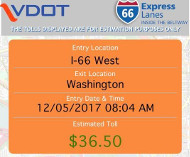12/19/2017
OPINION: $44 Tolls Are Just The Start For Virginia RoadsThe $44 one-way tolls in Virginia represent a deliberate choice to cut motorists out of transportation policy discussions.

Virginia politicians are feigning outrage over the $44 toll imposed on the short, one-way morning drive into Washington, DC on Interstate 66. The nation's latest high occupancy toll lane (HOT lane) project opened earlier this month with eye-popping fees for single occupancy drivers on their way to work.
Complaints about the exorbitant charges miss a far more important point. What is happening now is the fruit of policy choices the Old Dominion made decades ago. As a result, the commonwealth now has a vested financial interest in cultivating traffic congestion -- and there is very little the public can do about it.
By handing over public roads to companies headquarted in far-flung foreign nations, local and state elected officials can escape blame for extravagant fees charged to drive on pavement already paid for by taxpayers.
The I-66 outside the Beltway project, as well as the express lane schemes on Interstates 95, 395 and 495, all contain contract provisions negotiated behind closed doors that ensure improvements are never made to streets bordering the tolled routes. The theory is that the free roads are the "competition" for the toll road, so the deals say that the Virginia Department of Transportation (VDOT) must pay the foreign firms "compensation" in the event improvements are made. This is a powerful financial incentive for VDOT never to improve Northern Virginia's notorious congestion.
Leaders in Arlington, the city surrounding the tolled stretch of I-66, originally feigned opposition to tolling, but subsequent events show that they were just holding out to win lavish concessions from the state in the form of transit funding. With more buses tying up the streets already narrowed to accommodate bicycle lanes that are never used, the area's congestion will necessarily increase.
Defenders of the I-66 deal often say people can just use transit or carpool, but they fail to mention that the I-66 deal extended existing high-occupancy restrictions by three hours. The contract to extend I-66 tolling outside the Beltway limits improvements to the Orange Line Metro, and that the road will soon require three occupants instead of just two to qualify as a carpool. The I-95 and I-495 Express Lane deals force state taxpayers to pay penalties to Transurban, an Australian company, if carpooling actually becomes popular.
The blame for the situation falls squarely on the Public-Private Transportation Act, which the General Assembly enacted in 1995. This law, as subsequently amended, hands the executive branch and unelected boards carte blanche when it comes to tolling, and the Executive Mansion has used it with a vengeance.
The I-66 deal was finalized by Governor Terry McAuliffe, former Democratic National Committee chairman, fulfilling the tolled transportation vision of his predecessor, Tim Kaine, who also headed the DNC. Yet tolling is not a strictly Democratic enterprise.
Republican Governor Bob McDonnell embraced the scheme by opening the I-95 and Beltway Express Lanes, taking full advantage of massive financing provided by George W. Bush's Transportation Department staff -- many of whom are now working for toll road companies.
For the I-495 deal, state and federal taxpayers subsidized 82 percent of the costs involved, with private equity covering the cost of interest on the project. Taxpayers are picking up the tab for a deal from which they were cut out from the beginning. Now future transportation policy choices are locked behind contracts with foreigners.
To make matters worse, all of the gouging doesn't guarantee financial success. Quite the opposite, considering nearly every high-profile U.S. tolling deal has flopped. Just three years ago, Indiana's much ballyhooed selling of their road to a foreign company to pay for transportation projects ended in bankruptcy.
VDOT's own estimation of the original Beltway tolling proposal it received from Transurban pointed out that excessive levels of debt were being leveraged to pay for ongoing operations. "As a result," VDOT analysts explained, "the financial plan leaves little room for error in traffic assumptions, toll revenue collection, or adjustments in project costs." In other words, a financial downturn is all it takes to trigger a collapse. Whether that happens or not, motorists suffer either way.
Correction: This article has been updated to more accurately reflect the difference between the inside and outside the Beltway projects on I-66. VDOT runs the inside the Beltway program.


